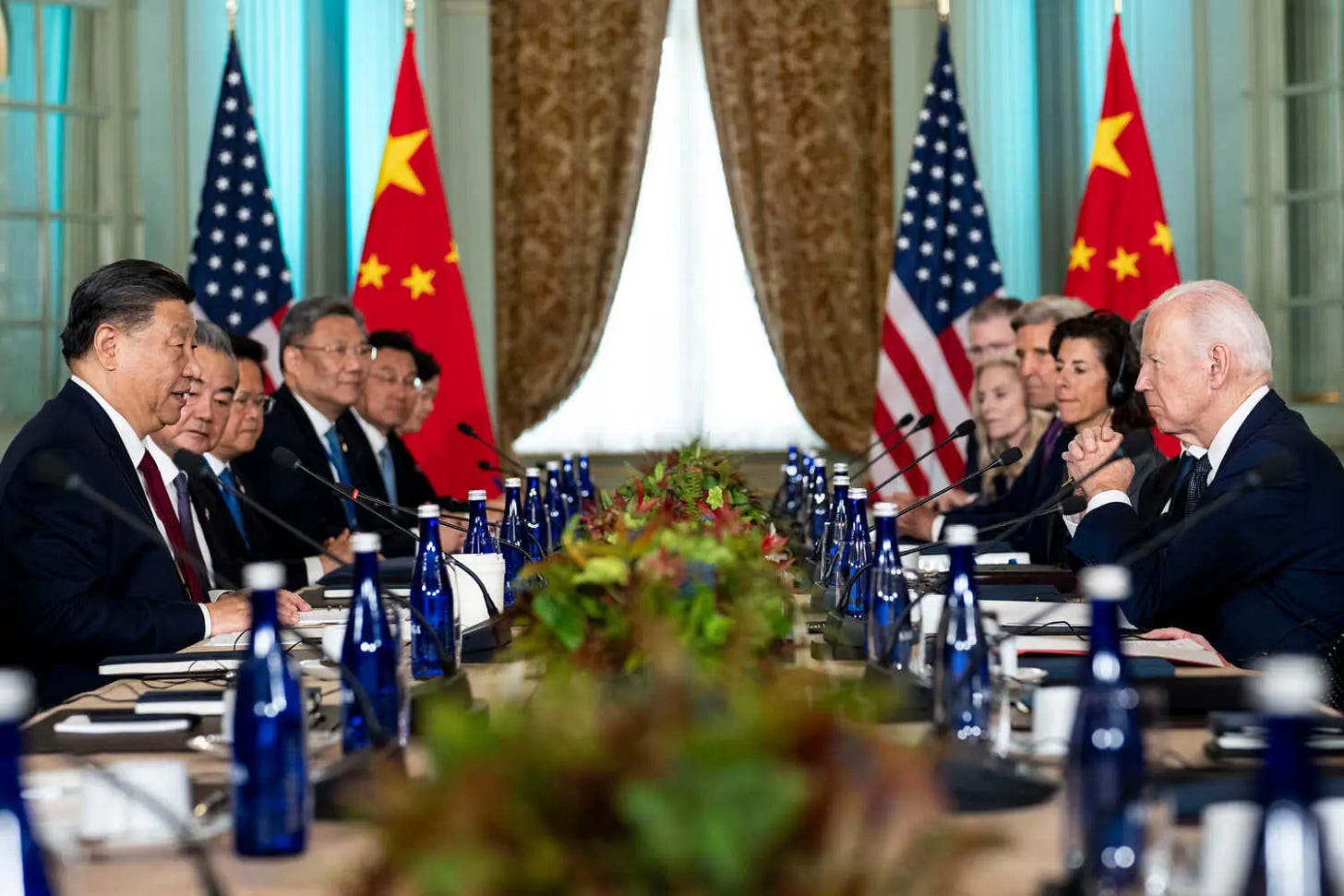Just days before Thanksgiving, the leaders of US and China make their best efforts to get to brass tacks, while keeping each of their options open on open-fanged competition around geopolitical, trade, and technology/AI issues. And by all indications, amidst pomp and circumstance at the APEC conference this week in San Francisco, surrounded by leaders from the tech industry, they are managing to ‘thread the needle’.
It’s a topic I’ve discussed at length on this site. As the NYTimes put it baldly, “Xi tells Biden ‘Planet Earth is Big Enough’ for both Superpowers’”.
For now anyway, as China hawks would point out. As the NYT goes onto to emphasize the nadir of the relationship between the two global mega-trading partners:
“The relationship between the United States and China is at a 40-year low, and American officials have tried to minimize expectations about what concrete commitments might emerge from the leaders’ first meeting in a year.”
“As President Biden meets President Xi Jinping of China in California on Wednesday, his primary goal will be simple: Find a way to avoid an increasingly bitter competition with China from tipping into conflict.”
“For two leaders who have agreed on very little as their nations have spiraled into their worst relationship in four decades, there have been hints of how they will try to nudge toward the appearance of agreement. A senior administration official said they are expected to reach the outline of an agreement.”
Expectations are low on both sides on what emerges from these high-level interactions. As the WSJ provides context:
“Wednesday’s summit is the first time the two leaders are meeting since the U.S. shot down a suspected Chinese surveillance balloon in February. The incident set U.S.-China relations plummeting further and was followed by protracted diplomatic maneuvering to try to stabilize ties. In that time, the Chinese economy has become increasingly mired in challenges.”
“That makes economic engagement a key topic for Beijing at the summit. According to people close to Beijing’s decision-making, the Chinese side wants to see dialogue started across a variety of sectors, including artificial intelligence and cancer research. The goal is to create a broad net of U.S. contacts both within and outside the administration who potentially could help lobby against further export and investment restrictions against Beijing, the people said.”
“Current and former U.S. officials have been skeptical of the value of such interactions, saying China uses them to tie the U.S. up in a “tyranny of the calendar,” with little expectation they will yield substantive change.”
Technology and AI is of course one of the key issues, highlighted by the venue in silicon valley. As the Information highlights in a piece by Founder/CEO Jessica Lessin, who accompanied Commerce Secretary Raimondo on a high-profile visit to China not too long ago:
“As for the relationship with China, I asked if she felt there had been progress in the relationship with China following her visit there this past August, when I traveled alongside her. She said she didn’t view the U.S.-China relationship “as one magic moment or any one big announcement.”
“It was an important and positive step,” she said, adding that she will be with the president for the meeting with President Xi and then will spend an hour or more with Chinese Commerce Minister Wang Wentao. “That’s good. That’s a positive outcome.”
I highlight all this in the context of the stakes for the US and its tech stalwarts like Apple, Nvidia and many other key US companies longer-term, despite the current geopolitical issues that have frayed relations to the bare bone, especially with the US tech community. This was noted by the WSJ citing a dinner for Xi with US CEOs that elicited standing ovations, but had a paucity of US Tech CEOs beyond Apple’s Tim Cook and Tesla’s Elon Musk (who didn’t stay for dinner)”:
“But there were some notable absences compared with a similar dinner in Seattle in 2015 when Xi brought along high-profile tech CEOs including Alibaba founder Jack Ma. This time, even though the dinner was in the tech hub of San Francisco, there were barely any Chinese entrepreneurs, and fewer U.S. tech leaders, such as Meta Platforms CEO Mark Zuckerberg, despite the dinner’s proximity to Silicon Valley.”
But the bare minimums were done by all sides, and optically, the visit and meetings were a success.
We are better off continuing to ‘thread the needle’ as best as possible through these early days of the AI Tech Wave and beyond. Thankful it’s getting attention at the highest levels of both governments. The game of ‘threading the needle’ continues. For now. Stay tuned.
NOTE: The discussions here are for information purposes only, and not meant as investment advice at any time. Thanks for joining us here)







